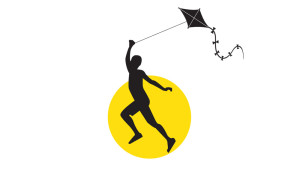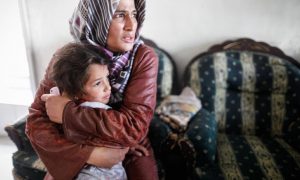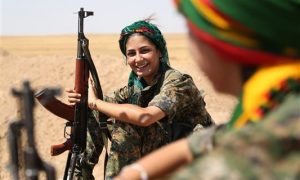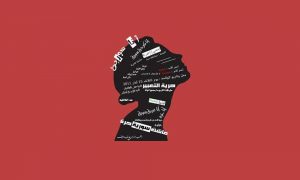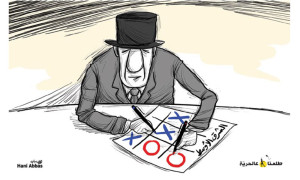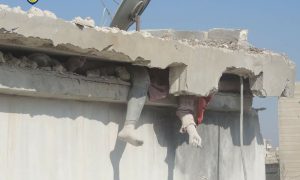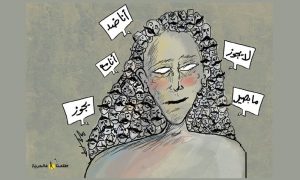Moussab al Hammadi
I know that many of the revolutions intellectuals will rush on women’s day to write about the importance of women’s role in the Syrian Revolution in terms of her being the man’s partner on the path of the revolution.
Although I do not completely disagree with this opinion, however, I fear that the manifestations of a woman’s role did not exceed, but in a few cases, sprinkling rice and flowers on protestors, praying for fighters, appearing on TV every now and then as a mother of three martyrs for example, or as a martyr’s wife who left a great burden of children behind.
Nevertheless, this is not the purpose I am writing for. I am writing today to warn of a danger hanging over the future of Syrian women and the signs have began to appear among the ribs of our revolution, and if continued and exacerbated they will oust the tremendous role Syrian women played in the history of their country and still are playing.
This danger appears, in my opinion, in the phenomenon of religious extremism which is clear in some Islamic battalions that are unfortunately penetrating amidst classes of the Syrian society where they incubate those battalions and bear the thought of the revolution. The Syrian society has always been tolerant and maintained a degree of moderation that lifted the Syrian man to the highest degrees of humane presence, which makes this aggravated phenomenon that we are witnessing today offensive not only to Islam as a religion of moderation and tolerance but to Muslims themselves.
Apart from theoretical explanation, I will cite an expressive incident that took place in one of the liberated towns of Syria.
One of the militant Islamic battalions in this town wanted one day to conduct a non-combat activity, such as aiding the civilians, compensating the damaged, or doing what is similar.
Residents of the town were surprised by a number of Mujahideen from this battalion standing at the girls’ high school gateway in town; waiting for high school students where they started presenting them with aid packages. The female students were surprised upon their arrival to their homes by the packages being a black chador-clad of the type in which it has two holes for the eyes, so if female students wear them they will disappear from existence except for their eyes.
Of course, this step was approved by the conservative class in town as an act of ardency from mujahideen over the honor of their sisters in town, and a good number of female students were convinced with the uniform; leaving the nice grey suit and wearing this new dress voluntarily.
I do not detract the value of this costume at all, on the contrary; I respect whoever wears it and believes in it. But I would like to draw your attention to the symbolic significance of what happened in this town, and the possibilities of a social and cultural setback in the role of the Syrian woman that may follow this external outfit transformation. Because he who presented the female students with this outfit presented it with the belief that a woman is an awrah that has to be veiled. This contradicts with the moderate Islam that Syria was distinguished by for many centuries.
There is a phenomenon with a significance that we find present in the revolutionary Syria. For decades our country welcomed tourists of different nationalities and with various kinds of fashion; the reference here is for females of course. We, as ordinary Syrians, felt like a lot of beautiful tourists wandered in the country with clothes that showed the beauty of their bodies, and we were happy to see them in old neighborhoods of Damascus and Aleppo and in all tourist sites throughout the country, we never had a problem in understanding that this female tourist is (different) culturally and had the right to be who ever she wishes to be and to wear whatever she wishes to wear.
Today, we have to realize the amount of change that has occurred in ourselves in terms of the status of Women when a non-Syrian female reporter or journalist inters the country wanting to roam in liberated areas but must wear a veil in order to do so, whatever country or culture she is from, as if she’s entering Iran the country of Mullahs and not Syria which is witnessing a revolution for freedom. She must be fully veiled in case a meeting with one of the revolutionary leaders was arranged, and this is not limited to Islamic leaders but also to those working under the umbrella of the Free Army, which reflects the change in the general mood of the country regarding the status of women.
I fear that a lot of young Syrian men today are adopting a false understanding of the verse (and stay in your houses) considering stripping women of their social and cultural presence to be a victory over the falling regime. I wish from the bottom of my heart for this to be no more than precarious fears, but in all cases this is an alarm bell that has to be ringed.

A Syrian semi monthly, independent, political, cultural, social, and economic magazine


